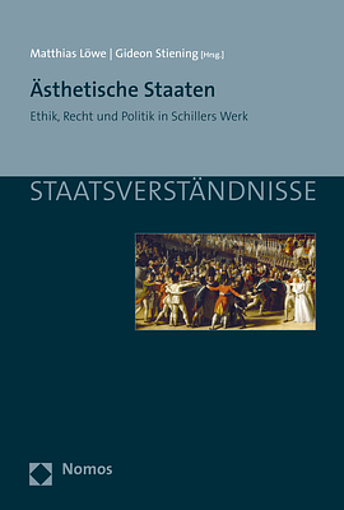englischFriedrich Schiller, the grand master of the classical aesthetic of autonomy, was also a political thinker. In the 1790s, reading Immanuel Kant upset him, as did the French Revolution: abuse of power, political resistance, conspiracy and tyrannicide are just a few of the genuinely political themes that he repeatedly varies in literary terms. The articles in this volume consider the connection between the political, legal and ethical dimensions of Schiller's work. In addition to his 'big' dramas as well as his philosophical and historical writings, they examine the nexus of ethics, law and politics at the 'margins' of his work, in both his short works and his literary fragments.
With contributions by
Oliver Bach, Antonino Falduto, Maria Carolina Foi, Markus Hien, Matthias Löwe, Vincenz Pieper, Jens Ole Schneider, Michael Schwingenschlögl, Sebastian Speth, Gideon Stiening and Ludwig Stockinger.
Friedrich Schiller, der Grandseigneur klassischer Autonomieästhetik, war auch ein politischer Denker. In den 1790er Jahren versetzte ihn die Lektüre Immanuel Kants ebenso in Aufruhr wie die Französische Revolution: Machtmissbrauch, politischer Widerstand, Verschwörung und Tyrannenmord sind nur einige der genuin politischen Themen, die er literarisch immer wieder neu variiert. Die Beiträge dieses Bandes betrachten den Zusammenhang zwischen politischen, juridischen und ethischen Dimensionen von Schillers Werk. Neben den „großen“ Dramen sowie den philosophischen und historischen Schriften wird der Nexus von Ethik, Recht und Politik auch an den „Werkrändern“ in den Blick genommen, in Schillers kleinen Formen ebenso wie in seinen Fragmenten.
Mit Beiträgen von
Oliver Bach, Antonino Falduto, Maria Carolina Foi, Markus Hien, Matthias Löwe, Vincenz Pieper, Jens Ole Schneider, Michael Schwingenschlögl, Sebastian Speth, Gideon Stiening und Ludwig Stockinger.


